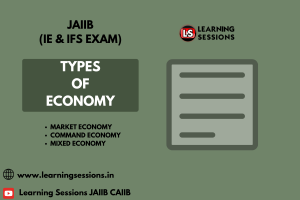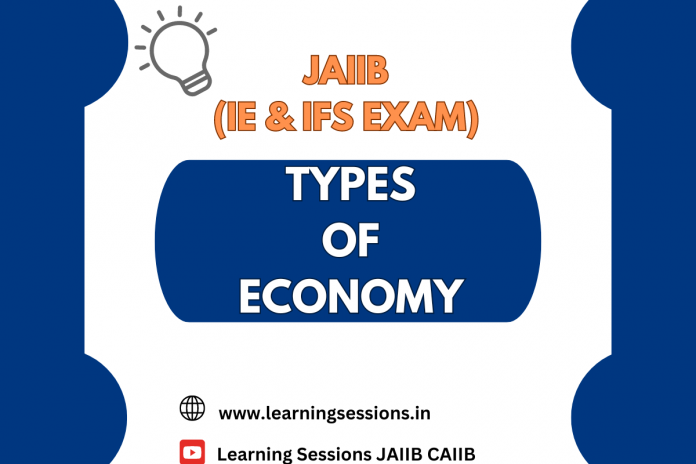The structure of an economy plays a significant role in shaping its financial system, influencing how resources are assigned, how wealth is distributed, and how banking and financial services operate. Understanding the different types of economies is fundamental for banking professionals, particularly those pursuing the JAIIB (Junior Associate of the Indian Institute of Bankers) certification. Learning Sessions presents this article that explores the different types of economies with a specific focus on the Indian economy and its evolution. JAIIB aspirants can better grasp the nuances of economic systems and their impacts on the financial sector by having in-depth knowledge about it.

📚 JAIIB Study Resources 📚
👉 Check Here
👉 Check Here
👉 Check Here
👉 Get Tests Here
👉 Check Here
DOWNLOAD PDF TYPES OF ECONOMY -CASE STUDY
Economies across the world are categorized based on how they manage resources, production, and distribution. The main types of economies are:
-Market Economy: An economic system where supply and demand determine the production and pricing of goods, with minimal government intervention.
-Command Economy: An economic system where the government controls and plans all aspects of production, pricing, and distribution.
-Mixed Economy: A hybrid economic system combining elements of both market and command economies, with both private and public sector roles in economic activities.
For the extensive preparation of candidates, get details through our YouTube videos for JAIIB IE & IFS Module wise Syllabus with explanations and tips to help candidates in their preparation journey.
You may also like these JAIIB Case Studies:
JAIIB | IE & IFS | FINANCIAL MARKET
JAIIB | IE & IFS | MERCHANT BANKS
In the end, for professionals working in the Indian financial sector, considering how different economic structures influence resource allocation, credit flow, and investment decisions is crucial for navigating the difficulties of India’s economy. Understanding the types of economies is essential for banking professionals, especially those pursuing JAIIB certification. India, as a mixed economy, has evolved from a progressive model to a more liberalized one, blending private enterprise with public sector control. This transformation has had profound effects on the Indian financial system, from the rise of private banking to the development of capital markets. Learning Sessions provides additional information about JAIIB IE & IFS LEASE FINANCE by giving examples of real life scenarios.
Learn more about this case study through our YouTube channel and PDF.
Get access to our Telegram Channel for free Pdfs of JAIIB.
You May also Find these JAIIB Posts Useful





